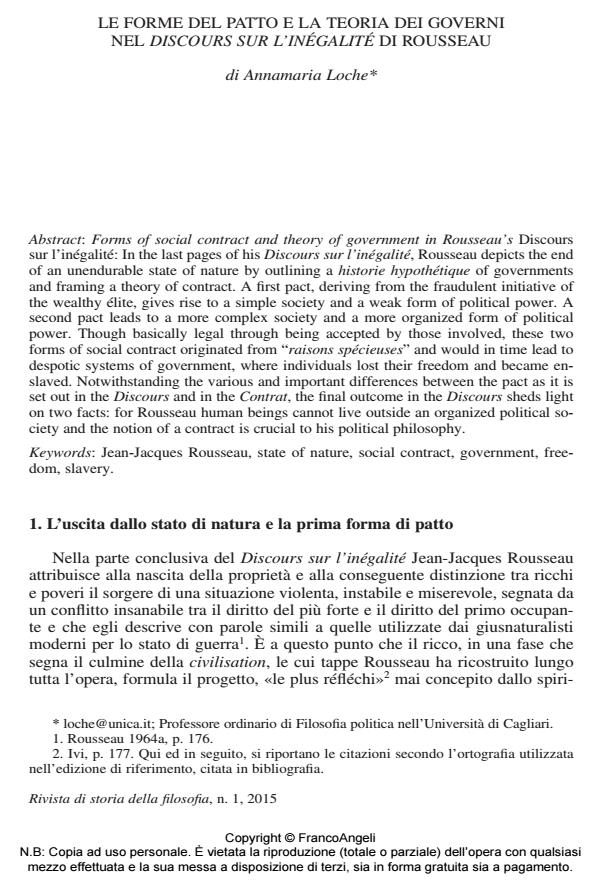Forms of social contract and theory of government in Rousseau’s
Journal title RIVISTA DI STORIA DELLA FILOSOFIA
Author/s Annamaria Loche
Publishing Year 2015 Issue 2015/1
Language Italian Pages 14 P. 65-78 File size 564 KB
DOI 10.3280/SF2015-001006
DOI is like a bar code for intellectual property: to have more infomation
click here
Below, you can see the article first page
If you want to buy this article in PDF format, you can do it, following the instructions to buy download credits

FrancoAngeli is member of Publishers International Linking Association, Inc (PILA), a not-for-profit association which run the CrossRef service enabling links to and from online scholarly content.
Discours sur l’inégalité: In the last pages of his Discours sur l’inégalité, Rousseau depicts the end of an unendurable state of nature by outlining a historie hypothétique of governments and framing a theory of contract. A first pact, deriving from the fraudulent initiative of the wealthy élite, gives rise to a simple society and a weak form of political power. A second pact leads to a more complex society and a more organized form of political power. Though basically legal through being accepted by those involved, these two forms of social contract originated from "raisons spécieuses" and would in time lead to despotic systems of government, where individuals lost their freedom and became enslaved. Notwithstanding the various and important differences between the pact as it is set out in the Discours and in the Contrat, the final outcome in the Discours sheds light on two facts: for Rousseau human beings cannot live outside an organized political society and the notion of a contract is crucial to his political philosophy.
Keywords: Jean-Jacques Rousseau, state of nature, social contract, government, freedom, slavery.
- - Bachofen 2002 : Blaise Bachofen, La condition de la liberté. Rousseau, critique des raisons politiques, Payot, Lausanne 2002.
- - Bernardi-Bachofen 2008 : Bruno Bernardi e Blaise Bachofen, Introduction, notes, bibliographie et chronologie a Jean-Jacques Rousseau, Discours sur l’origine et les fondements de l’inégalité parmi les hommes, Flammarion, Paris 2008.
- - Derathé 1993 : Robert Derathé, Jean-Jacques Rousseau et la science politique de son temps, Vrin, Paris 1950; tr.it. Rousseau e la scienza politica del suo tempo, il Mulino, Bologna 1993.
- - Fetscher 1977 : Iring Fetscher, Rousseaus politische Philosophie. Zur Geschichte des demokratischen Freiheitsbegriffs, Luchterhand, Neuwied am Rhein und Berlin 1968;
- tr. it. La filosofia politica di Rousseau. Per la storia del concetto democratico di libertà, Feltrinelli, Milano 19772.
- - Gatti 2012 : Roberto Gatti, Rousseau. Il male e la politica, Studium, Roma 2012.
- - Goldschmidt 1974 : Victor Goldschmidt : Anthropologie et politique: les principes du système de Rousseau, Vrin, Paris 1974.
- - Reale 1983 : Mario Reale, Le ragioni della politica. J.-J. Rousseau dal “Discorso sull’ineguaglianza” al “Contratto”, Edizioni dell’Ateneo, Roma 1983.
- - Rousseau 1964a : Jean-Jacques Rousseau, Discours sur l’origine et les fondements de l’inégalité parmi les hommes, (texte établi et annoté par Jean Starobinski), in Bernard Gagnebin et Marcel Raymond, (éds.), OEuvres complètes, Gallimard, Paris 1964, vol.
- III, pp. 109-223. - Rousseau 1964b : Id., Discours sur l’Économie politique, (texte établi et annoté par Robert Derathé), Ivi, pp. 239-278.
- - Rousseau 1964c : Id., Du contract social; ou principes du droit politique, (texte établi et annoté par Robert Derathé), Ivi, pp. 347-470.
- - Silvestrini 2002 : Gabriella Silvestrini, Républicanisme, contrat et gouvernement de la loi, in Michèle Cohen-Halimi (éd.), L’anthropologie et la politique selon Jean-Jacques Rousseau, «Les Cahiers Philosophiques de Strasbourg», t. 13, 2003, pp. 37-66.
- - Silvestrini 2012 : Ead., Diritto naturale e volontà generale. Il contrattualismo repubblicano di Jean-Jacques Rousseau, Claudiana, Torino 2010.
- - Starobinski 1964 : Jean Starobinski, Introduction e Annotations a Rousseau 1964a, cit.
Annamaria Loche, Le forme del patto e la teoria dei governi nel discours sur l’inégalité di Rousseau in "RIVISTA DI STORIA DELLA FILOSOFIA" 1/2015, pp 65-78, DOI: 10.3280/SF2015-001006